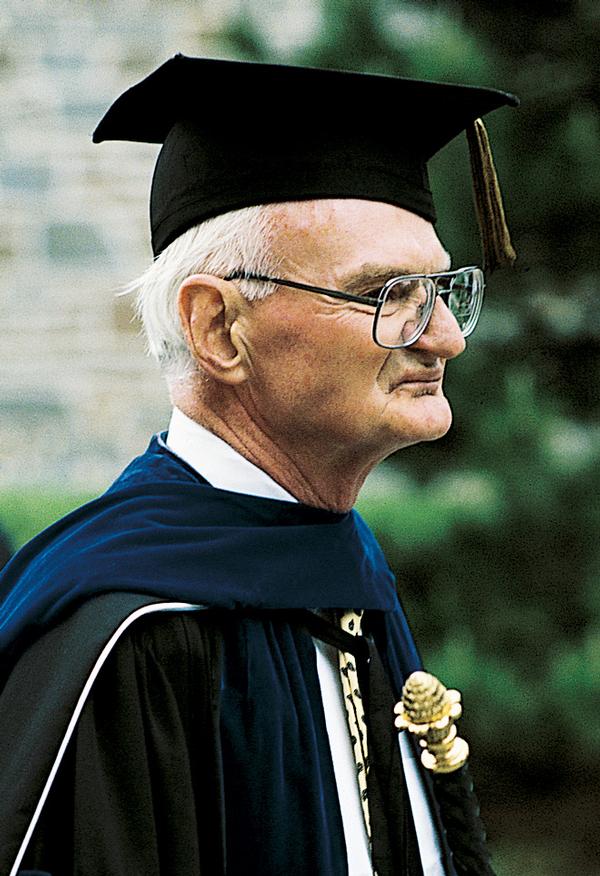Necrology
Because Hamilton Remembers


Dwight Newton Lindley '42
Jul. 4, 1920-Jul. 18, 2007
Dwight Newton Lindley ’42, who for 34 years contributed greatly to sustaining the excellence of Hamilton’s English department, was born on the 4th of July, 1920, in Glen Ridge, NJ. A son of Theodore J., a stock broker, and Evelyn Cruikshank Lindley, he grew up in the Garden State and prepared for college at Deerfield Academy in Massachusetts. “Newt” entered Hamilton from Upper Montclair, NJ, in 1938, following his brother, Bryant P. Lindley ’35. He joined his brother’s fraternity, Alpha Delta Phi, and went out for track as well as soccer, in which he earned a letter. He also contributed his extracurricular time to Hamilton Life as fraternity editor. When a junior, he earned recognition, and envy, as the first of his class to receive faculty permission to keep an automobile “legally” on campus. It was in recognition of his outstanding academic record, culminating in his election to Phi Beta Kappa.
Dwight Lindley, who first heard the radio bulletin about the Japanese attack on Pearl Harbor while in his room at the Alpha Delt house, enlisted in the U.S. Army shortly after his graduation with honors in English literature in 1942. He had initially tried to enter the Navy, only to be rejected when he was found to be color blind. After serving in the military police and the infantry, he became a master sergeant in the 1263rd Combat Engineer Battalion and accompanied it on the final mad dash by American forces through Germany to the Elbe in the final European phase of World War II. By that time he was a married man, having wed Jane E. (Janie) Morrison, a fellow sergeant (she in the Marine Corps Women’s Reserve) in Essex Falls, NJ, on September 2, 1944.
Inspired to enter teaching by the example and “particular brand of magic” of Professor George L. Nesbitt, his mentor at Hamilton, Dwight Lindley enrolled in Columbia University’s department of English following his discharge from the Army in 1946. He earned his M.A. degree in 1947, and while pursuing his Ph.D., began his teaching career as an instructor at Bowdoin College. In 1952, after two years at Bowdoin, he returned to Hamilton as an assistant professor and young colleague of Professor Nesbitt’s, from whom he once said he had learned all he knew about teaching.
During his early years on the faculty, he primarily taught medieval English literature as well as expository writing, a program he helped develop. Faithfully adhering to the department’s high standards and rigorous grading system, he required 12 to 14 papers in his freshman English course during the semester, at least two of which had to be “yes” papers, meaning that they contained no significant grammatical or stylistic errors, in order to pass the course. With patience and understanding combined with acerbic humor and limited tolerance for laziness or sloppy work, he motivated and challenged students to take a firm grip on the English language. He was wholeheartedly committed to good writing derived from sound thinking, and those who survived their experience with him acquired a new confidence in their writing abilities that benefited them throughout their later lives.
After George Nesbitt’s retirement in 1973, Dwight Lindley, who in 1958 had received his Ph.D. from Columbia in 19th-century literature (his favorite novel was George Eliot’s Middlemarch), took over his Romantic and Victorian literature courses. He also chaired the English department from 1968 to 1974 and served as acting dean of the College in 1974-75. Appointed to a full professorship in 1965 and as the Hamilton B. Tompkins Professor of English Literature, succeeding George Nesbitt, in 1973, he retired from that chair in 1986. However, as professor emeritus, he continued to teach a course a year for several years.
Dwight Lindley’s high standards and passion for literature left an indelible imprint on generations of Hamilton students. Although their first impression of him may have been as a “crusty” character, those who were fortunate in becoming better acquainted with him saw the kindness and consideration underneath. Among his colleagues he was known for his wry and frequently biting wit, but also for his thoughtfulness and preference for the succinct. Within the department he readily took on unpleasant duties after customarily remarking, “If nobody objects, I’ll take care of this myself.” “Like the Victorian figures he admired,” as his colleague, Professor of English John H. O’Neill recalls, “he had a strong sense of duty and of responsibility for others.”
Although primarily devoted to teaching, Dwight Lindley also wrote articles and edited Adventures in English Literature, a high school text book. But he took particular pride in his most significant scholarly achievement, The Later Letters of John Stuart Mill, 1849-1873, which he edited with Francis E. Mineka ’29, and which was published in four volumes by the University of Toronto Press in 1973.
In 1996, Janie and Dwight Lindley left their home on College Hill to reside in a retirement community in Walpole, MA. There, Dwight took loving care of Janie, who had been in ill health for many years. She died in 2001. Up to the end of his own life, he continued to take a lively interest in Hamilton and its well-being. His devotion to the College remained unabated, and was most affectionately expressed in his Half-Century Annalist’s Letter, “A Candle in One’s Heart,” at Reunions 1992.
Dwight N. Lindley died on July 18, 2007, while hospitalized in Norwood, MA. He is survived by a son, David M. Lindley; two daughters, Marguerite (Peggy) Almanas, wife of Robert C. Almanas ’75, and Ann Aranguren; and six grandchildren, as well as nephews including Peter M. Lindley ’63. Memorial services were held at St. James Episcopal Church in Clinton, where Professor Lindley had been a vestryman and lay reader. Interment was in the College Cemetery.
Note: Memorial biographies published prior to 2004 will not appear on this list.
Necrology Writer and Contact:
Christopher Wilkinson '68
Email: Chris.Wilkinson@mail.wvu.edu

The Joel Bristol Associates
Hamilton has a long-standing history of benefiting from estate and life payment gifts. Thoughtful alumni, parents, and friends who remember Hamilton in their estate plans, including retirement plan beneficiary designations, or complete planned gifts are recognized and honored as Joel Bristol Associates.
